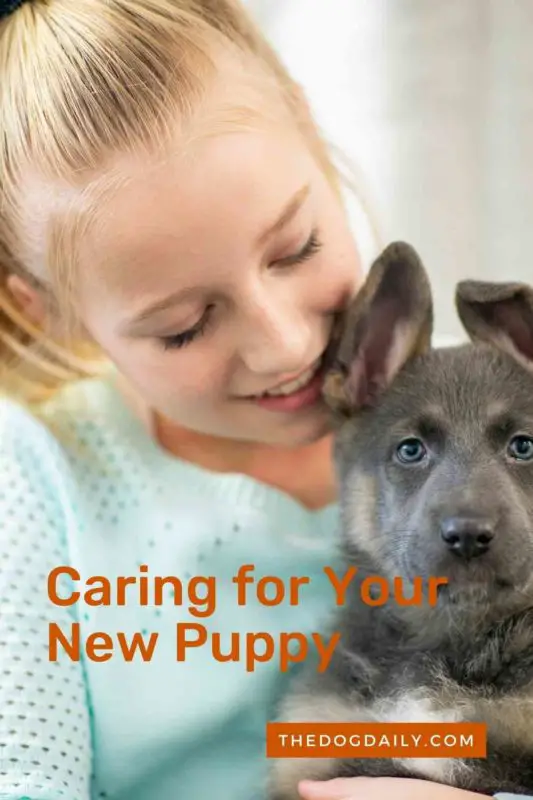What are the Basics of Caring for a New Puppy?
So, you’ve found a new puppy and fallen in love. It’s easy to see why… there’s nothing cuter than a puppy! But adopting a puppy is the easy part. Raising a puppy, however, isn’t as easy as you might think.
When you bring your new little furry bundle of joy home, you can pretty much count on three things: cleaning up messes, a huge change in your lifestyle, and lots of love, snuggles, and playtime.
You’ll learn pretty quickly that raising a puppy takes dedication and patience. It’s going to be a lot of work initially, but we promise it’s worth it!
Here’s how to establish good habits in the first few weeks so that your puppy is a happy, healthy member of the family for years to come.
Choose the Right Vet for Your New Puppy
Visiting the vet for a checkup is one of the first things you and your new puppy should do together. Choose a vet that’s in a convenient location and has a good reputation. Ask for references from friends and family and read online reviews before making a final decision.
Visiting the vet as soon as possible is important for ensuring that your puppy is free of any health concerns. But just as importantly, it also establishes a good foundation of preventive health care and gives your pup a chance to get acquainted with his vet, which will make visits less stressful in the future.
Ask Lots of Questions During Your Puppy’s First Checkup
Now is the time to ask about vaccine schedules, parasite control, and when your puppy should be spayed or neutered. Be sure to ask about puppy foods recommended by vets, how much your new puppy should be eating, and how often he needs to be fed.
Your vet can also offer tips on housetraining, basic obedience, and socialization. Jot down whatever questions you have as they come up, so you don’t forget to ask them during your first visit.
Puppy Proof Your Home
Puppies are curious by nature, and they love to explore by chewing, with no regard to whether the item is dangerous or valuable. Do yourself and your fur baby a favor and spend some time puppy proofing before you bring your new family member home.
Here are some things you can do to keep your puppy safe and ensure that your favorite things remain intact:
- Keep electrical cords covered or out of reach.
- Put medicines and toxic cleaning supplies away in puppy proof cabinets
- Designate a safe place for your puppy to hang out when you’re not supervising him, such as a crate, or a small room closed off with a baby gate.
- Invest in puppy safe toys. Never give him old shoes or stuffed animals to play with. It’s essential to teach him the difference between his toys and your kid’s stuffed animals or your favorite shoes.
- Get down on your new puppy’s level and put up anything dangerous or valuable.
Establish a House Training Routine from Day One
Housetraining is usually right at the top of the list of priorities for new puppy parents. Keep in mind that it’s much harder to break a bad habit once it starts, so you’ll want to establish a good house training routine right from day one.
Housetraining a puppy is an exercise in patience and positive reinforcement. Have some pet safe enzymatic cleaner handy as part of your plan for cleaning up accidents in the house, so your puppy isn’t tempted to return to the same spot over again. But never yell at your puppy or punish him for having an accident. That will teach him to hide it next time he has to go.
Crate training is an excellent way to housetrain your new puppy, and most puppies love having their own cozy space to go to. Until your puppy is housetrained, he should be in his crate whenever you’re not available to supervise him.
The most important thing you can do is offer positive reinforcement every time your puppy goes to the bathroom outside. Here are the most important times to take your puppy out to potty:
- Anytime he or she wakes up from a nap
- Immediately after every meal
- Anytime he or she seems to be looking for a place to go
- Right before bedtime
- At least every two hours
Be on the Lookout for Signs of Illness
Your new puppy’s immune system is still developing, so it’s important to be on the lookout for any signs of illness so you can act quickly if something goes wrong. If you notice any of these symptoms, call your puppy’s vet right away:
- Vomiting or diarrhea
- Lack of appetite or low weight gain
- Lethargy or lack of interest in play
- Wheezing, coughing, nasal discharge, or difficulty breathing
- Pale gums
- Discharge, redness, or swelling around the eyes
- Constipation or inability to urinate
- Excessive scratching at the ears, especially if accompanied by head shaking or foul odor from the ears
Socialize Your Puppy
Socializing your puppy is extremely important for preventing behavior problems later in life. Once your puppy has had his first vaccinations, begin introducing him to new sounds, experiences, people, and pets.
Socialization classes for puppies are a lot of fun, and they’re a great way to meet other pet parents. Once your vet gives the ok, doggie daycare and dog parks can also be a great option.
Teach Your Puppy Basic Obedience
Your puppy wasn’t born knowing good manners, so it’s up to you to teach them. Just like socializing your puppy, teaching basic obedience when your puppy is young establishes a good foundation for later in life.
Every puppy should learn how to walk correctly on a leash, sit, stay, and come when called. These commands are essential because they can help your puppy stay safe in
potentially dangerous situations.
Basic obedience classes for puppies are available in most areas, starting when puppies are around four to six months old. They’re a great way to learn along with your new puppy.
Some Final Advice
There’s no doubt that a puppy can bring joy to any home, but they need to learn rules and boundaries just like kids. Dedicating yourself to raising your puppy the right way now will ensure that he’s a well-mannered, happy member of the family for years to come.
Article written by Author: Nicole McCray


Thank you for your tips about puppy socializing and how to do it effectively. Luckily for me, the neighborhood I live in seems to be very kind towards pets since most of the residents here also walk their dogs and play with them in the nearby parks. Since my environment can help me do this, I’ll make sure I socialize well with any puppy I get from a nearby pet store.
You gave helpful tips about socializing puppies and the best method of doing it. Thanks